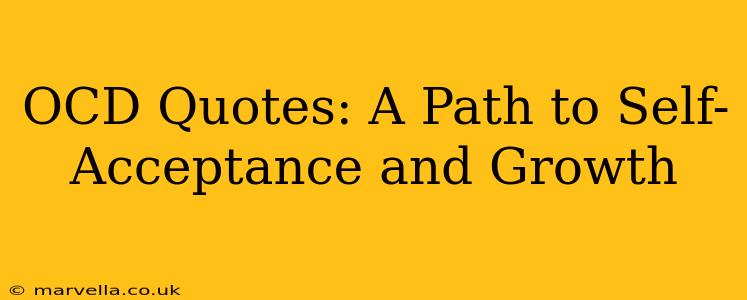Obsessive-Compulsive Disorder (OCD) is a complex mental health condition that affects millions worldwide. Living with OCD can be challenging, marked by intrusive thoughts (obsessions) and repetitive behaviors (compulsions) that significantly impact daily life. While there's no magic cure, understanding, acceptance, and consistent effort toward recovery are crucial. This article explores powerful OCD quotes that offer solace, hope, and a pathway towards self-acceptance and growth. We'll also address some common questions surrounding OCD and its management.
What are some helpful quotes for people with OCD?
Many quotes offer comfort and insight for those navigating the complexities of OCD. These quotes aren't meant to replace professional help but rather to provide a sense of shared experience and encouragement during difficult times. Some find solace in quotes emphasizing self-compassion, while others find strength in those focused on resilience and the journey of recovery. Finding the right quote is deeply personal and depends on individual needs and experiences.
How can quotes help in managing OCD?
The power of a well-chosen quote lies in its ability to resonate deeply with the individual's experience. A quote can:
- Validate feelings: It acknowledges the struggles of living with OCD, making individuals feel less alone in their experiences.
- Offer hope and inspiration: Quotes emphasizing recovery and self-acceptance can instill optimism and motivation for continued efforts.
- Promote self-compassion: They encourage self-understanding and kindness, crucial elements in managing the self-criticism often associated with OCD.
- Provide a sense of perspective: Quotes can help contextualize the condition within a larger framework of human experience, reducing feelings of isolation.
However, it is crucial to remember that quotes are not a substitute for professional treatment. Therapy, medication, and self-help strategies are essential components of an effective OCD management plan.
What are some common misconceptions about OCD?
Many misconceptions surround OCD, often fueled by inaccurate portrayals in media. These misconceptions can prevent individuals from seeking help and understanding their condition. Some common misconceptions include:
- OCD is just about cleanliness: While cleanliness compulsions are common, OCD manifests in diverse ways, involving intrusive thoughts and repetitive behaviors related to various themes (e.g., symmetry, order, harm, contamination).
- People with OCD are just "high-strung": OCD is a distinct mental health condition with specific diagnostic criteria, not merely a personality trait.
- People with OCD can "just snap out of it": OCD requires professional intervention, including therapy and sometimes medication, to manage effectively. It's not something that can be overcome simply through willpower.
What are some resources for people with OCD?
Several resources provide support and information for individuals with OCD and their loved ones:
- The International OCD Foundation (IOCDF): This organization offers comprehensive information, support groups, and a directory of therapists specializing in OCD treatment.
- The Anxiety & Depression Association of America (ADAA): Provides information on anxiety disorders, including OCD, along with resources for finding treatment.
- National Institute of Mental Health (NIMH): Offers research-based information on OCD and other mental health conditions.
Seeking professional help is crucial for effective OCD management. A therapist specializing in OCD can provide evidence-based treatment, such as Exposure and Response Prevention (ERP) therapy, which is considered the gold standard for OCD treatment.
Conclusion: Embracing the Journey
Living with OCD is a journey, not a destination. While challenges undoubtedly exist, embracing self-compassion, seeking professional help, and finding inspiration in powerful quotes can significantly contribute to a path of self-acceptance and growth. Remember, you are not alone, and recovery is possible.

